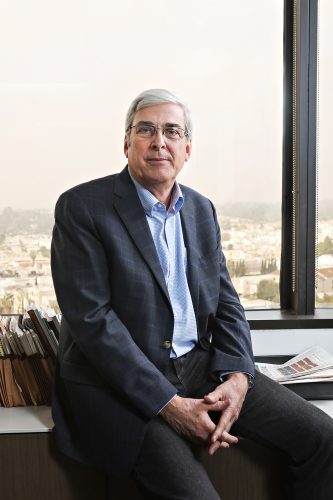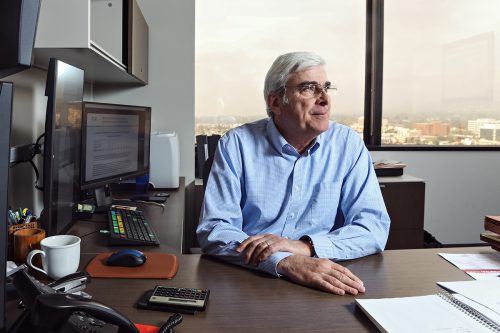Thomas Atteberry Tagged as the Investor who Predicted the Crash
Thomas Atteberry ’75 puts stock in his ability to communicate, from radio to Wall Street.
Thomas Atteberry Tagged as the Investor who Predicted the Crash
Thomas Atteberry ’75 puts stock in his ability to communicate, from radio to Wall Street.
Tagged as the “investor who predicted the crash” of 2008 by CBS MoneyWatch, Tom Atteberry is a longtime partner at First Pacific Advisors LLC, an institutional money management firm that manages upward of $30 billion. A Chartered Financial Advisor, Atteberry is the portfolio manager for First Pacific’s New Income Inc., a mutual fund, and Source Capital Inc., a closed-end fund.
Before joining Los Angeles-based First Pacific in 1997, Atteberry was chief fixed-income strategist of Fifth Third Bank and chief investment officer of Mercantile Bank in Joplin, Missouri.
Atteberry earned a reputation as an effective communicator for his ease in talking with prospective clients, reporters and crowds, a skill he sharpened in his days as a DJ at KTCU-FM (88.7) in Fort Worth.

Tom Atteberry ’75, First Pacific Advisors partner, offers a wealth of advice, such as working on your communication skills. Photo by Christina Gandolfo
A few years after working in radio post-graduation, Atteberry realized that a career in investments was his real passion and never looked back.
“Once I figured it out, I love investing from the standpoint of understanding companies’ securitization and just investing in them. It never ceases to stimulate me as far as finding new ideas to invest in. It’s challenging every day, and it changes every day,” he said. “I’m amazed that people will actually pay me to do what I love to do.”
After almost four decades in the business, Atteberry has amassed a wealth of life lessons.
You’re going to have a lot of failures and mistakes in life. Own up to them. Learn from them. Sit down and understand what went wrong and why. You’ve got to be willing to be upfront with yourself and others, and say, “Hey I made this error. This is what I learned from it, and this is why I’m better for it.” I don’t think people look at you in a lesser light if you’ve made mistakes or had failures in life. It’s what you do with them and how you build from them that is more important.
Sit down and honestly review what your personal and professional strengths and weaknesses are. What do you truly want to do? What are you passionate about? Write down the plan for your life and profession in real detail. Combine that with your passions, strengths and weaknesses, and lay out in hard copy what you want to do, and then you can fill in how you’re going to get there.
What I mean by “write it down” is pencil and paper — not on a computer.
I discovered that when you do pencil and paper, it really engages everything – the physical act along with the mental act — and makes it tangible.
Now, having said all that, you do need to be flexible and realize that it may change. Life circumstances or your real passion may change. I started out as a disc jockey, but after five years, I realized what I really like is investing. And here I am. So there is a flexibility to this.
I take my weaknesses and improve them as best I can, but more importantly, I engage — through hiring and collaboration — people who have the strengths to complement my weaknesses.
I found if I kept solutions to problems or objectives simpler, then I could get them to be executable and repeatable — and that made accomplishment a lot easier. Figure out what you do well and keep repeating it. Don’t make things overly complex.
You have to be able to communicate your ideas and solutions in simple and concise ways so others will understand, because you need others to help you accomplish what you’re trying to achieve. It’s not a solo effort.
Take courses in speech and how to make presentations. You need to make yourself comfortable standing up and presenting to others. I’m convinced that regardless of what profession you pursue, that’s the most important thing. As you get older, the technical skills become less important to what you’re doing and the communication skills become far more important.
Study history. Study history again. And then keep studying history. Then when you’re finished with that, study philosophy. That’s going to help explain an awful lot of why people behave the way they do because they’ve been behaving the same way for hundreds of years.
You do need to take some time off periodically to go focus on something that doesn’t deal with your profession — a sport, art, music, whatever you do for relaxation. It rejuvenates you. Sometimes you just have to force yourself to do that.

CBS MoneyWatch tagged Tom Atteberry the “investor who predicted the crash” of 2008. Photo by Christina Gandolfo
I learned from my father that at the end of the day, you’ve got to remember the order of things, and family is first. That means that at times you have to tell someone in business that they are going to have to wait while you deal with family. It just can’t be replaced. But there are only 24 hours in a day and it does get hard.
We have a mutual fund that has a specific style and strategy and objective. I’m going to go talk to 10 people about what we do and how we do it. In the end, eight or nine are going to say no. That’s fine because I was really only looking for the one or two who look at what we do, agree with how we do it and realize it helps solve a problem they have or an objective they’re trying to reach. The eight others are just telling you that what you have, they don’t need. It’s nothing personal.
For any investing program, a defined strategy is needed. The biggest component is in the measurement of risk. This is done in a very quantitative manner, such as what percentage of my savings can I afford to lose. My investment temperament is such that I do not want to experience a permanent loss of my capital. I came to this realization after losing enough money in the early 1980s so that I had to adjust my lifestyle to save back the losses.
Pay less attention to if your returns are beating some predefined traditional stock or bond index. This can keep you from chasing returns. Instead, look at your investment from the aspect of whether or not the after-tax returns are doing better than inflation so the result is the increase in real wealth.
Remember one of the great wonders of the financial world is the value of compound interest. Just take a sum of money and compound it for, say, 10-20 years at just 4 percent, and it is amazing how a savings account can grow.
— As told to Rachel Stowe Master
Edited for clarity and length.

Your comments are welcome
Comments
Related reading:
Features
KTCU Celebrates 70 Years
The campus radio station offers students a chance for real-world experience.
Research + Discovery
Shaddock Venture Capital Fund Allows Students to be Entrepreneurs and Investors
Young entrepreneurs make pitches while classmates decide on actual investment.
Alumni
Bill McLeRoy Shares his Fundraising Philosophy
Senior Principal at The Whitestone Group shares lessons learned in his 30-plus years of service and experience.